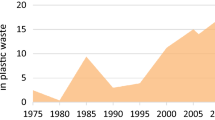Abstract
Plastic has become a benefit for the mankind because of its functionality and it is a commonly used material in their day to day activities. The indispensable habit of using the plastic by the present society for various purposes like carry bags, storage bags, packing materials, and so on is leading to the large-scale production of such products. After its usage or the effective life, it is regarded as waste. The sustainable disposal of these waste plastic is a critical issue and the very essence of the present-day waste management. The role of stakeholders (waste generators, the municipal corporations, and manufacturers of plastic) in disposal, on responsible terms is very crucial. The annual waste generated in India is about 62 million tons of which the plastic waste is 5.6 million tons. If the plastic waste is not collected, this leads to haphazard dumping and clogging of the waste. If it is collected and dumped to landfill sites without any treatment, it causes underground water pollution and other consequences. This paper aims to study the role of reverse logistics in plastic waste management and to explore sustainable solution to the problem of plastic waste management by applying reverse logistics. The present study is mainly conceptual in nature. The study suggests the embracing of corporate social responsibility (CSR) for creating awareness and to educate the waste generators. The study also recommends that the municipal corporations can tag on the public–private partnership (PPP) for collecting and segregating such plastic waste. Extended Producer Responsibility (EPR) may be recommended for the manufacturers as an eventual tool for the efficient waste management. Thus, the proactive collection and source segregation of the locally generated plastic waste and the implication of the initiatives by the municipal corporations can act as a primary solution to this problem.
Access this chapter
Tax calculation will be finalised at checkout
Purchases are for personal use only
Similar content being viewed by others
References
Abeliotis, K. (2011). Life cycle assessment in municipal solid waste management. Retrieved from https://www.intechopen.com/books/integrated-waste-management-volume-i/life-cycle-assessment-in-municipal-solid-waste-management.
Banerjee, T., Srivastava, R. K., Hung, Y. T. (2014). Plastic waste management in India: An integrated solid waste management approach. https://www.researchgate.net/publication.
Bhattacharya, R. R. N. S., Chandrashekar, K., Deepthi, M. V., Roy, P., Khan, A. (2018). Challenges and opportunities: Plastic waste management in india.
Legal Issues on Municipal Solid Waste (MSW) PPPs; https://ppp.worldbank.org/public-private-partnership/sector/solid-waste.
Nair, S. (2009). Reverse logistics gaining ground in Indian market. Retrieved from https://www.livemint.com.
Plastic Waste Management Rules. (2016). www.envfor.nic.in.
Ruj, B., Pandey, V., Jash, P., Srivastava, V. K. (2015). Sorting of plastic waste for effective recycling. https://www.researchgate.net/publication/305503715.
Singh, P., Sharma, V. P. Integrated plastic waste management: Environmental and improved health approaches. https://www.sciencedirect.com/science/article/pii/S1878029616301578.
Science and Environment—Seven Charts that explain the plastic pollution problem. (2017). https://www.bbc.com/news/science-environment-42264788.
Valle, P. O. D., Menezes, J., Reis, E., Rebelo, E. (2009). Reverse logistics for recycling: The customer service determinants. International Journal of Business Science and Applied Management, 4(1).
Wilhelm, R., Resin identification codes. https://www.astm.org/newsroom/astm-plastics-committee-releases-major-revisions-resin-identification-code-ric-standard.
Author information
Authors and Affiliations
Corresponding author
Editor information
Editors and Affiliations
Rights and permissions
Copyright information
© 2020 Springer Nature Singapore Pte Ltd.
About this chapter
Cite this chapter
Madhura, R. (2020). A Study on Plastic Waste Management by Stakeholders Using Reverse Logistics. In: Ghosh, S. (eds) Urban Mining and Sustainable Waste Management. Springer, Singapore. https://doi.org/10.1007/978-981-15-0532-4_31
Download citation
DOI: https://doi.org/10.1007/978-981-15-0532-4_31
Published:
Publisher Name: Springer, Singapore
Print ISBN: 978-981-15-0531-7
Online ISBN: 978-981-15-0532-4
eBook Packages: Earth and Environmental ScienceEarth and Environmental Science (R0)




